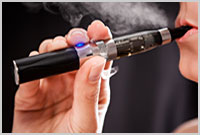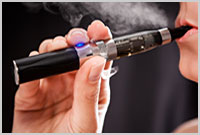 Data published today in the weekly publication of the US Centers for Disease Control and Prevention provides further evidence that the presence of vitamin E acetate (oil) in illicit market, e-liquid vape products is likely associated with EVALI (e-cigarette or vaping product use-associated lung injury).
Data published today in the weekly publication of the US Centers for Disease Control and Prevention provides further evidence that the presence of vitamin E acetate (oil) in illicit market, e-liquid vape products is likely associated with EVALI (e-cigarette or vaping product use-associated lung injury).
Minnesota investigators identified the presence of the oil additive in 24 of the products used by 11 patients with the lung disease. Virtually all of the patients interviewed in the study acknowledged obtaining vape products on the underground market.
A previous analysis in 2018 of illicit vape products seized by police in Minnesota failed to identify the presence of vitamin E. “Whereas vitamin E acetate was not detected in the limited number of tested products seized in 2018, it was detected in products seized in 2019, suggesting that vitamin E acetate might have been introduced recently as a diluent or filler,” investigators reported.
They concluded, “According to these and other published data, using THC-containing products with vitamin E acetate appears to be associated with EVALI; however, it is possible that more than one compound or ingredient could be a cause of lung injury, and evidence is not yet sufficient to rule out contribution of other toxicants.”
Weeks earlier, CDC representatives for the first time identified vitamin E acetate as a “very strong culprit of concern” in EVALI.
The online publication Leafly.com has issued several extensive reports regarding the recent rise in popularity of vitamin E among illicit market vendors of e-liquid products. Their reporting indicates that beginning in late 2018, some vendors began to use the oil as an additive in an effort to thicken the consistency of their e-liquids and to mask dilution.
Full text of the study, “Characteristics of e-cigarette, or vaping, products used by patients with associated lung injury and products seized by law enforcement – Minnesota, 2018 and 2019,” appears online in the journal Morbidity and Mortality Weekly Report here.


